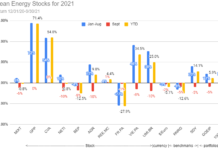Jim Lane
In Washington, Donald Trump captured the US Presidency in an upset victory that confounded pollsters and political pundits even as it delighted supporters of his maverick candidacy based on themes of immigration and trade reform coupled with a message that government policies of the past generation had failed for too many Americans.
An unexpected series of wins across US Midwestern states – capturing Iowa, Pennsylvania, Wisconsin and Ohio which had gone for Obama in 2012 – provided a comfortable margin of victory in the Electoral College and the popular vote.
5 Themes
Some immediate themes emerge for the global bioeconomy as the US turns now from its lengthy election process to the transition period between Administrations.
1. Trade rebalancing is front and center on the agenda. That’s not entirely bad for the bieconomy and for US-based manufacturing. Over at the Renewable Fuels Association, CEO Bob Dinneen noted:
“A core principle of the Trump campaign has been putting America first and more aggressively pursuing fair trade agreements that recognize the value of American products.”
2. Climate action is likely to be scaled back sharply. The President-elect is opposed to the Paris Climate Agreement we’ll have to see how that translates into meeting obligations imposed by that deal. At the very least, leadership on climate activities is likely to pass to others, and a shift back towards policies that favor US domestic production of coal, oil and natural gas is likely.
3. First-gen biofuels less impacted. Owing to fitting in to Trump’s themes of economic nationalism, manufacturing revival and domestic energy security, a Bush-era emphasis on the energy security aspects of shifting from imported fuels to biofuels is likely to remain in favor. Trump himself strongly backed the Renewable Fuel Standard, almost alone among front-runners for the Republican nomination, and Iowa Governor Terry Branstad, and Bruce Rastetter, the president of Summit Ag Group, had been appointed to Donald Trump’s agricultural advisory panel in August. Eric Branstad, the governor’s son. led anti-Cruz forces in the state a year ago and was chairman of the successful Trump campaign in Iowa.
RFA CEO Bob Dinneen added:
“The president-elect repeatedly expressed strong support for ethanol, generally, and the Renewable Fuel Standard (RFS), specifically, on the campaign trail. He understands the importance of clean, domestic energy resources and the economic power of value-added agriculture. We are confident Mr. Trump will continue to support the expanded production and use of fuel ethanol. Moreover, the president-elect is committed to removing regulatory barriers that impede growth. We look forward to working with a Trump administration to remove unnecessary volatility restrictions that have discouraged market acceptance of higher level ethanol blends like E15 and created unreasonable administrative burdens on gasoline marketers willing to offer these fuels to consumers. FWe are eager to work with the new Administration on myriad trade challenges currently facing the U.S. ethanol industry.”
Adam Monroe, President Americas for Novozymes (NVZMY) said:
“During the campaign, the President-elect expressed support for biotechnology generally and bioenergy and agriculture specifically, all core to America’s economy and keeping our country on the leading edge of innovation and discovery. At Novozymes, we’re looking forward to supporting those ambitions.
“President-elect Trump understands the need for good policy to help foster American innovation. It’s incumbent on the private sector to imagine and build cutting-edge solutions to solve society’s challenges – but we count on the President-elect to encourage that kind of groundbreaking innovation with smart, consistently-administered policy, fueling our economy and creating products used across the world.”
4. Reduced emphasis on government spending and a reduction in the government’s role in the economy can be expected to impact applied government R&D programs. However, the incoming Administration has not run on an anti-R&D program, but rather an anti-regulatory program and we can expect more action at this stage in rolling back EPA’s influenace rather than in wholesale slashing of government research.
5. A Farm Bill is due in 2018 and spending and priorities until then will largely continue along the lines established in the 2014 Farm Bill. Pro-domestic energy forces in the Midwest largely supported the Trump candidacy, and there’s no evidence yet that there will be wholesale changes in US domestic agricultural policies. A focus on renegotiating or exiting NAFTA will have impact on agricultural prices.
Looking at the result for meaning
1. A mirror of 2008. At the Digest, we see this election in many ways as a mirror of 2008 a candidate campaigning on “change you can believe in” and pointing to “inconvenient truths” in trade and immigration – but aimed at reversing Obama’s policies rather than Bush’s. We may well see, as a result, an unwinding of portions, or the whole of, the US health care reform authorized under the Affordable Care Act and changes in foreign policy. Supporters of the President-elect may well find that change is harder to deliver than it is to vote for we’ll see whether this President grapples more effectively to deliver on his ambitions and permanently embed change into the US way of life.
2. Too many left behind? Most experts believe that the shift towards global free trade is, on the average, better for all. Also, that the shift towards an advanced economy based around the innovation center of Silicon Valley, the policy center of Washington and the financial center of New York is, on average, better for all.
But experts also agree that trade deals and seismic shifts in the economy create winners and losers. The average economic result, for example, of NAFTA may well be positive. But it creates a have/have-not equation in sophisticated economies, and we have seen a concentration of wealth and power in recent years and a decline in the prosperity of the middle class. It is not controversial to say that people are left behind as economies and countries evolve, and in the US it appears that voters feel too many have been left behind. There simply are not as many affluent Americans who are for “more of the same” as there used to be, as wealth concentrates into the hands of fewer and fewer.
The discussion of how to spread the wealth of any nation is one that parties grapple with should it be through unleashing more opportunity for those left behind, or through redistributive tax and spending policies. Last night, the US public spoke on that one.
Jim Lane is editor and publisher of Biofuels Digest where this article was originally published. Biofuels Digest is the most widely read Biofuels daily read by 14,000+ organizations. Subscribe here.








